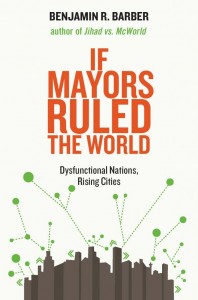
Alex Marsh, Professor of Public Policy and Head of the School for Policy Studies
How should a world characterised by increasingly complex interdependence be governed? If most of the major challenges we face have no respect for the artificial borders marking out nation states, how can we identify and deliver effective solutions?
The answer Benjamin Barber offered in his stimulating presentation at the Bristol Festival of Ideas on Monday night is that we need to look to cities. More specifically, we need to look to mayors. His case is in part rooted in the fact of an increasingly urban future. But it is also based upon the characteristics he identifies as distinctive to mayoral governance. This is an argument developed at greater length in his new book If mayors ruled the world: Dysfunctional nations, rising cities (Yale University Press).
Barber starts from the premise that we can no longer look to the nation state to find solutions to some of the world’s most pressing problems. The nation state may have made sense when social and economic problems were contained within borders. That is not the world we inhabit now. Even if a problem starts as local, it can soon become global.
But in a world of interdependence the community of nations has time and again proved itself unable to deliver an effective response. Whether it be policy on climate change, security, migration or public health, attempts to find cross-national solutions are as likely to result in stalemate or veto by individual sovereign states as they are to result in decisive action. When problems demand collaborative solutions, nation states can find it hard to move beyond their competitive impulses.
Equally importantly, nation states fail to secure the sort of broad-based democratic support that is necessary to deliver legitimacy to radical solutions. This is because of the limited and rather abstract nature of national citizenship. It is a citizenship of rights, without meaningful obligations that have an everyday urgency.
Barber contrasts this with the way in which mayors operate. Models of mayoral governance differ in their detail, but their defining characteristic is pragmatism. Barber’s argument has a strongly structural flavour. He argues that for mayors “issues shape behaviour in common ways” and that “ideology doesn’t serve them very well; and nor do political parties”. Mayors need to find solutions to real problems that affect the day to day lives of hundreds of thousands of people.
It would be nonsensical for mayors to behave in the ways that we observe at the US federal level – with party factions driven by ideology forcing a government shutdown. Mayors don’t have the luxury to play politics in this way – their decisions affect people’s lives more immediately and more directly.
Because cities tend to be more diverse than nations, for mayors to succeed they are obliged to recognise difference and to operate inclusively. Collaboration and consensus-seeking are the name of the game, rather than the competition characteristic of nation states.
One of Barber’s most striking claims is that mayors can be thought of as neighbours. They tend to have firm roots in the cities they serve. Unlike representatives of national parliaments who can be parachuted in from anywhere, when it comes to mayors “people don’t like carpetbaggers”. This confers a different form of legitimacy upon a mayor. And the success of a mayoralty comes from being built upon many citizens coming together in their street or neighbourhood to fulfil the obligations of citizenship. At this local level democratic citizenship can be meaningfully embodied in everyday practice in civil society and in collective deliberation. It can be connected to structures of representative government by mechanisms such as participatory budgeting.
 So Barber sees cities as the key vehicle for democratic re-engagement – “what is happening in cities kindles hope in young people and creates new inspiration around ancient ideas”. But how does that connect to the global challenges we face?
So Barber sees cities as the key vehicle for democratic re-engagement – “what is happening in cities kindles hope in young people and creates new inspiration around ancient ideas”. But how does that connect to the global challenges we face?
Here Barber’s argument is not that cities should or could be doing things to address pressing global issues. Rather his argument is that they are already doing things. While negotiations at national level have reached stalemate, cities are getting on with sharing best practice across nations and continents. This takes place through bodies such as United Cities and Local Governments or the International Council for Local Environmental Initiatives. Cities are taking steps to deal with issues like climate change, congestion or immigration in new and innovative ways. And these local steps can make discernible impacts on global problems.
Yet Barber goes beyond these collaborative arrangements to argue that the distinctive characteristics of mayors, backed by their particular types of legitimacy, mean that they should take a more prominent and formal role in global governance. He is therefore advocating for the benefits of a global parliament of mayors. The logistics of such a body are clearly immensely challenging. But Barber reports that there are a number of mayors, across several continents, willing to be involved in piloting the idea. The view is that it is an idea that will prove its value through practice. If the mayors derive benefit – not for themselves but for their citizens – from participating in such a body then it will grow. If they do not, then it will wither.
In the context of widespread concern about the health of democracy, it was refreshing to listen to a presentation that offered some cause for optimism. The focus upon cities not simply as engines of economic growth but also as the key arena for democratic renewal is welcome. But it has to be acknowledged that the challenges to realising the vision set out by Professor Barber are formidable. In that respect his emphasis upon the obligations of active citizenship are of fundamental significance. If the challenge is to be met then it requires everyone to engage.
In addition, Barber’s argument demands close critical engagement. The idea can be refined through dialogue. This is something Barber invited. We can expect a number of scholars to accept the invitation. An important debate has begun.

Thanks for your very thoughtful summary of and reflection on my Bristol lecture.